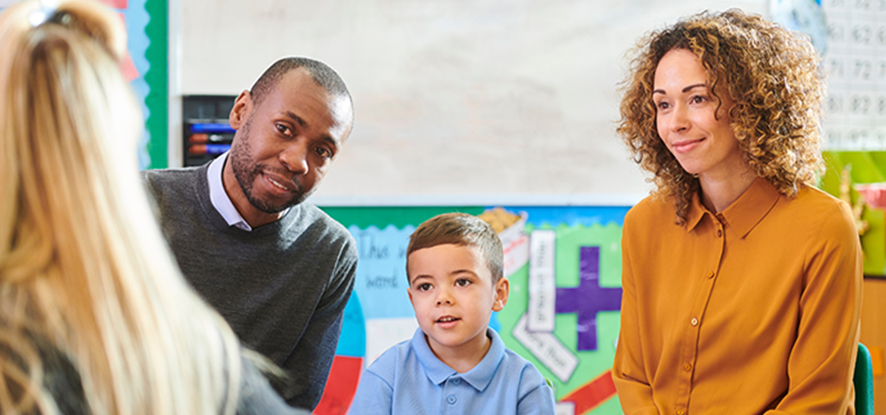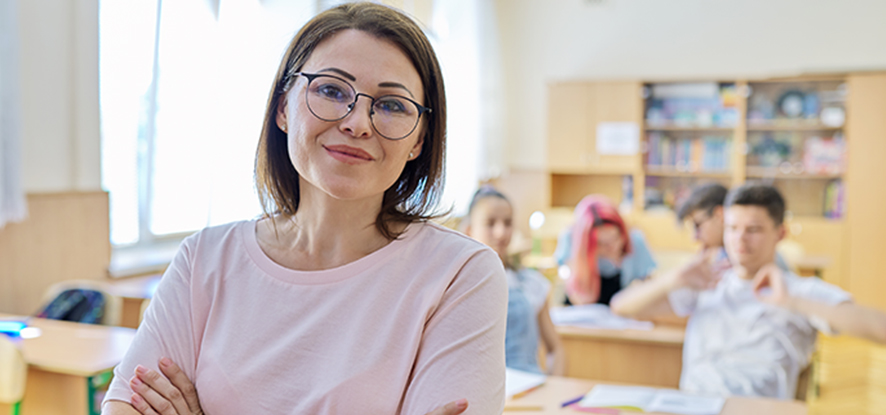Building Effective Parent-Teacher Relationships

Many different factors contribute to building a strong classroom atmosphere, and creating strong partnerships between teachers and parents is a crucial part of student success. We'll explore practical tips for fostering these relationships, emphasizing the importance of parent communication in the educational journey.
8 Tips for Fostering Parent Relationships
1. Get to Know The Parents
To build strong relationships with parents, actively understanding their backgrounds and concerns is pivotal for effective communication with families. Developing tailored strategies that cater to the unique needs of each individual student is key to this approach.
Taking the time to learn and remember the names of parents or caregivers is a foundational step in establishing personal contact and trust. An introductory phone call at the start of the school year can significantly enhance this effort. This call isn't just about imparting information; it's an opportunity to listen, to understand parent/caregiver dynamics, and to acknowledge any special circumstances like custody arrangements that might affect the student. Such thoughtful communication lays the groundwork for ongoing, meaningful relationships with parents, ensuring a collaborative and supportive environment for each student's educational journey.
2. Create Clear Lines of Communication
Parents appreciate communication that is clear and consistent. The goal is to keep parents involved and informed about their child's progress and school activities without overwhelming them with too many sources of information.
Select a few effective communication tools that most parents will be able to easily access. Whether it’s email, a dedicated app, or take-home folders, the chosen method of communication should cater to the preferences and accessibility of the parent community. By limiting the number of channels, parents know exactly where to look for information, reducing the likelihood of missed updates or confusion.
This approach also streamlines the process for teachers, allowing them to focus on creating quality content for these communications, whether it’s a detailed email update, a concise message on an app, or important documents in a take-home folder. By keeping communication straightforward and centralized, both parents and teachers can engage more efficiently and effectively, fostering a stronger, more cohesive educational environment for the students.
3. Communicate Regularly
Regular communication plays a pivotal role in maintaining a smooth and transparent flow of information between teachers and parents. This consistent approach helps prevent surprises and miscommunications, ensuring that all parties are on the same page regarding a student's progress and school activities.
Incorporating a mix of updates about upcoming events, special events, and general progress can keep parents engaged and informed. For instance, a weekly update can be an effective way to summarize what you've covered in class, highlight any special achievements, and provide a heads-up about any upcoming events or important dates. This regular rhythm of communication builds a reliable and predictable structure, which parents can depend on for staying connected with their child’s educational journey.
Positive messages are also a crucial part of regular communication. It's important to celebrate successes, no matter how small, as this can have a huge impact on a child's self-esteem and motivation. Sharing these positive messages with parents not only keeps them informed about their child’s progress but also creates an atmosphere of positivity and encouragement. By maintaining this steady stream of communication, teachers can foster a strong, collaborative relationship with parents, which is essential for the holistic development of the student.
4. Start With Good News
Initiating parent-teacher communication with positive news sets the stage for open, constructive discussions and fosters positive relationships. This approach is especially beneficial when navigating conversations that might lead to a difficult situation. Start on a positive note in order to establish a foundation of trust and mutual respect. This will make it easier to address more challenging topics later on.
Emphasize the successes and achievements of the student, no matter how small. This helps to reinforce a positive attitude in both the parents and the student. This strategy of positive communication is not just about highlighting the good but also about framing challenges as opportunities for growth and improvement.
When dealing with difficult parents, this approach can be particularly effective. It can help in diffusing tension and redirecting the conversation towards a more productive and solution-focused dialogue. This doesn't mean avoiding the discussion of areas where the student might need improvement, but rather, it ensures that such discussions are embedded within a context that acknowledges and values the student’s strengths and achievements.
This method of starting with good news is not just a communication tactic; it’s a way to build and maintain a positive environment that supports student achievement. By consistently applying this approach, teachers can nurture an atmosphere of positivity and collaboration, vital for the overall development of their students.
5. Accommodate Language Barriers
In today’s diverse educational environments, you must be able to accommodate language barriers in order to maintain effective communication with all parents. Recognizing and addressing these barriers is integral to ensuring that all parents have the opportunity to be engaged in their child's academic success.
Offering translation services or materials in multiple languages can significantly enhance parental engagement. When parents can easily understand and communicate with the school, they are more likely to participate actively in their child's education. This can be achieved through various communication methods, such as translated newsletters, multilingual websites, or interpreters at parent-teacher meetings.
Most schools or districts will help coordinate these services so you don't have to worry about finding a translator or translating paperwork on your own.
By acknowledging and addressing language barriers, schools demonstrate their commitment to the entire school community. This inclusive approach helps build a more cohesive and supportive environment,. When parents are able to communicate effectively with the school, regardless of their native language, it bridges gaps and fosters a stronger, more connected community.
6. Be Kind But Professional
Striking the right balance between kindness and professionalism in contact with parents is essential for creating a positive and effective school environment. This balance influences not only the nature of individual interactions but also shapes the overall communication style within the school community.
When teachers approach conversations with kindness, it demonstrates empathy and understanding of the parents' perspectives and concerns. This empathetic approach is crucial, as it helps in building trust and rapport. However, it is equally important to maintain a professional boundary. This means being clear, respectful, and consistent in communication, and ensuring that discussions remain focused on the student's welfare and educational progress.
A professional communication style also involves being well-prepared for meetings, providing factual and relevant information, and following up on any agreed actions or commitments. This reassures parents that their child’s education and well-being are being handled with care and competence.
7. Involve Parents In The Classroom
Encouraging parents to get involved in the classroom has been shown to enhance students' educational experiences. Inviting parents to join classroom activities or school events deepens their understanding of the learning environment and builds a strong community sense.
Parental involvement can include everything from helping in classroom activities to attending school events. As parents engage in the school day, they gain firsthand insights into their child’s educational setting. They observe classroom dynamics and teaching methods, connecting more with their child’s learning journey. This engagement enables them to support their child’s education at home more effectively.
Active parental engagement in school activities also sends a positive message to students. It demonstrates that their education is a collaborative effort and a priority. This involvement boosts student morale and motivation, leading to improved academic performance.
Parental engagement also benefits and supports teachers. Involved parents bring new perspectives, offer volunteer assistance, and enrich the educational environment. Creating accessible and appealing opportunities for parents is crucial. It fosters an inclusive atmosphere that values and welcomes their participation.
8. Share Student Successes
Regularly sharing students' successes and achievements with their parents strengthens the bond between home and school. This practice keeps parents informed about their child's progress and fosters a sense of pride and joint accomplishment.
Celebrating student successes goes beyond academic achievements. It encompasses all areas of development, including improvements in social skills, participation in extracurricular activities, and personal milestones. By recognizing these varied aspects of student growth, teachers can provide a more holistic view of a child’s progress.
Communicating these successes can be done through various means, such as newsletters, emails, or even a note in the student's take-home folder. The key is to ensure that this communication is consistent and reflects the individual achievements of each student. Personalizing these updates makes them more meaningful to parents and reinforces the notion that the school values and understands their child.
This regular sharing of positive news also creates a more collaborative and trusting relationship between teachers and parents. It helps in building a supportive community around the student, where both home and school work together to nurture and celebrate their growth. Ultimately, highlighting student successes contributes to a positive school culture, encouraging students to strive for continuous improvement and success.

Best Ways to Utilize Parent-Teacher Conferences
Parent-teacher conferences are a great opportunity to increase communication with parents, especially those you don't get to see often throughout the school year.
Conferences offer a dedicated time for parents and teachers to discuss a child's progress, address concerns, and plan for future success. To make the most of these meetings, here are some tips:
- Prepare in Advance: Both parents and teachers should come prepared. Teachers can gather samples of the
student's work, grades, and notes on their behavior and social interactions. Parents
can prepare a list of questions or concerns they have about their child's progress.
- Set Clear Objectives: Begin the conference with clear objectives. What are the key points each party wants
to address? This helps keep the conversation focused and productive.
- Discuss Academic and Social Development: Address both academic performance and social skills. It's important to give a holistic
view of the child’s development, including their strengths and areas that need improvement.
- Create a Collaborative Atmosphere: The conference should be a dialogue, not a one-sided conversation. Encourage open
communication and active listening to understand each other's perspectives.
- Create an Action Plan: End the meeting with an action plan. What are the next steps for the student, teacher,
and parents? Set goals and strategies for support at home and in school.
- Follow-Up After the Conference: Finally, a follow-up plan is essential. This might include scheduled check-ins or
further meetings to assess the student's progress and revisit strategies as needed.
Why Parent/Teacher Relationships Are Important
The partnership between parents and teachers impacts a child's academic and personal development in many ways:
- Enhanced Student Self-Esteem: A strong partnership between parents and teachers gives children a supportive network,
reinforcing their sense of worth and confidence. When students feel understood and
supported by the key adults in their lives, it positively impacts their self-esteem.
- Improved Academic Performance: Strong parent-teacher relationships allow for the sharing of insights and strategies
tailored to the individual needs of the student. This cooperation can lead to more
effective learning experiences and, consequently, better academic outcomes.
- Development of Better Social Skills: These relationships model positive social interactions and communication skills
for students. Observing their parents and teachers engage in respectful and effective
communication teaches them valuable social behaviors.
- Consistent Support Network: Strong parent-teacher relationships create a supportive and nurturing environment
for the student, both at home and in school. This network is crucial for identifying
and addressing any challenges the student might face, facilitating timely support
and intervention.
- Overall Personal Development: The synergy between parents and teachers extends beyond academic achievements, influencing
the child's personal growth and development. It's a partnership that shapes the child's
educational journey and lays the foundation for their future success.

How a Master’s in Teaching Can Help Improve Your Parent Relationship Skills
Whether you're a current teacher looking to improve your skills or an aspiring teacher pursuing your initial teaching certification, a Master of Arts in Teaching (MAT) program can help you develop holistic teaching skills, including effective parent communication. The esteemed 11-month program at Pepperdine University has a 100% graduate employment rate and offers practical experience with over 200 teaching sites. The hybrid format, available on the West LA, Calabasas, or Irvine Campuses, provides flexibility and real-world experience. Graduates not only earn their degree but also a multiple or single-subject preliminary teaching credential.
Join us at Pepperdine University's Graduate School of Education and Psychology to enhance your teaching and parent communication skills, setting the stage for a successful and fulfilling career in education.